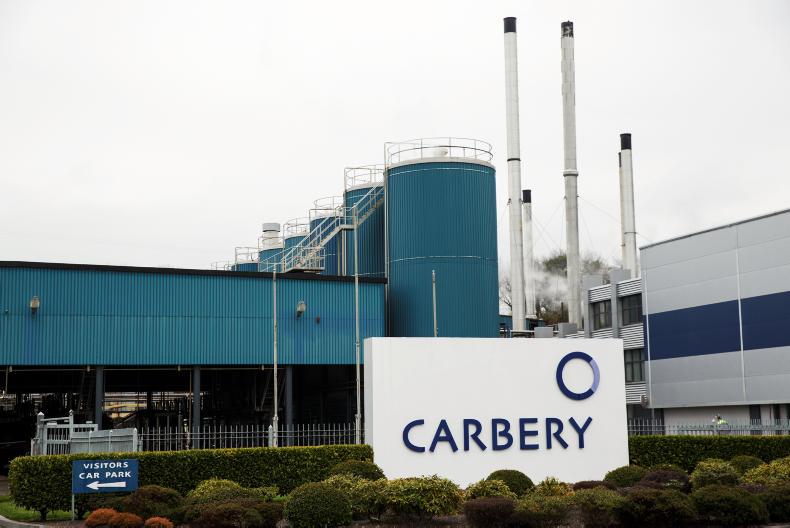Following a surge of milk production in 2015, Carbery recorded a more modest 4.4% increase in 2016, processing 470m litres of milk at Ballineen, due to poor spring weather and lower milk prices.
Turnover decreased 2.7% to €340m affected by weaker dairy markets and currency translations relating to reporting of its overseas businesses.
Once the effect of currency translations are stripped out, profits increased 9% on a constant currency basis. Earnings (EBITDA) increased 4.8% to €37m. Margins increased from 7.3% to just shy of 8%.
Milk price performance
The co-op paid 31.2c per litre (including VAT at average solids) in 2016 utilising its stability fund (€5m), which was created in 2015. Overall, given the weak dairy markets, it supported the milk price by €20m or 4c/l.
Dan MacSweeney, chief executive officer, said: “We prioritised the need to support milk prices and paid industry leading milk prices.”
He added this was possible due to the underlying performance in both the Irish-based dairy and nutrition businesses, along with its international flavours business Synergy.
It invested €15.4m in its operations and IT systems in 2016. This brings the co-op’s investment in the business over the past five years to €78m. It also invested €5.9m in research and development.
Net debt at 31 December 2016 was reduced by €1.6m, to €26.2m. Net debt to earnings was a low 0.7 times, providing the group with significant capacity to invest. The net asset value at year-end increased by €17m to €211m.
Carbery began delivering cream to Ornua’s new butter manufacturing and packaging plant at Kerrygold Park.
Following a fire at the alcohol plant (which processes lactose) in September at Ballineen, the plant is now fully refurbished and is back in full production.
Total remuneration of 14 senior management executives amounted to €4.5m, the majority of which relates to Synergy. Separately, €1.7m is being provided for relating to the long-term incentive plan in the Synergy business. Non-executive directors (nine) were paid a total of €151,134.
By Division
The dairy (cheese and associated ingredients) division, which accounts for 46% of the business, reported turnover up 4% to €156.4m.
Ballineen is the largest single cheese-producing facility in Ireland, producing approximately 50,000t – almost 25% of Ireland’s annual cheese output.
MacSweeney said the cheese division was “affected by weaker pricing in 2016 and added that, as always, cheese price recovery was slower than other dairy categories”. He said the cheese business is well invested and efficient.
The ingredients division, which includes Synergy, accounts for 52% of the business and reported turnover down 8% to €177m.
He said it had a strong year performance and was delivering in high-value areas, such as infant nutrition and clinical nutrition.
Synergy, which operates across three sites in North America – one in Brazil, Thailand and a now consolidated site in the UK – was beating the growth in the global flavours market, which is growing at 4% per annum, according to MacSweeney.
He said that, as well as driving organic growth, Synergy is looking to drive future growth through further acquisitions, however adding “only if they are at value”.
Based on a survey of milk suppliers conducted in 2011, Carbery is expecting milk supply to increase 50% by 2020. It has already reached 38% growth.
MacSweeney is expecting this to slow to a more normalised 3% to 4% annual growth over the next three years. Milk suppliers are running 16% ahead compared to this week last year. However, he notes that the 2016 figures are off weak comparatives, due to cold weather in 2016.
Shares
To date, €8m of equity directly from “B” suppliers has been raised.
Following the creation of “B” shares, where a supplier must share up to a minimum holding, B shares continue to increase in value, reflective of the increasing balance sheet and performance in the business.
As a result, the value of the B shares increased 14% from €3.08 in 2016 to €3.51 in 2017.
The board has introduced the concept of processing notes, which are at a price of €1 to help ease the financial burden on suppliers who are required to share up.
Brexit
“Carbery is not immune to the challenge Brexit poses, as up to 60% of our cheese goes to the UK. If it reverts to WTO status, it is difficult to see how cheese could carry a 50% tariff,” warns MacSweeney.
He said the group was currently evaluating all potential scenarios, with a view to limiting the impact on shareholders and milk suppliers, adding that any future investments will be taken in light of Brexit.
While he hopes for a reasonable outcome in the negotiations, what is required is a long transition arrangement to allow businesses to plan.
He believes there should be an onus on the Government to lengthen the transition arrangement and for a joined-up industry and sector approach.
He says that there will need to be significant assistance to assess alternative opportunities, even though state aid rules may make this difficult. He said Carbery will access all options, including other types of cheeses and transitioning into dairy powders.






 This is a subscriber-only article
This is a subscriber-only article










SHARING OPTIONS: